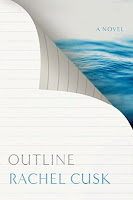Outline by Rachel Cusk: A review
What do we know about the narrator of Rachel Cusk's novel? Her name is Faye. She is a writer. She lives in London and is divorced. She is the mother of more than one child. She has taken a job teaching a summer writing course in Athens. That's about it. We never get below the surface with her. She remains a cipher.
This cipher, however, seems to have the ability to inspire other people to reveal their deepest secrets. Throughout this very unusual and very intelligent book, Faye has a number of conversations with people that she encounters and all of these people end up telling her stories about themselves and all the people they are closest to in their lives.
Her first encounter happens on the plane when she is flying from London to Athens to take up her summer job. She sits next to an older man, a Greek who is returning home. He unburdens himself about his failed marriages. Initially, he mentions only two but we learn later that he has actually had three. He talks about his children who have various problems. The conversation will continue in Athens when he contacts Faye and takes her out on his boat a couple of times and eventually makes a pass which she spurns.
But there are several other encounters; with her students in the writing class; with fellow writers; with people whom she meets for coffee or for dinner. Always these meetings turn into confessionals with the other person revealing intimate details of his/her life to Faye.
All of these conversations are reported to us in the voice of Faye, the observer and writer. Faye shares several characteristics with the author and it is tempting to see this as a kind of memoir. It is difficult to tell where the line is drawn between autobiography and fiction.
Somewhat curiously, while these people's stories are told in Faye's voice, we almost never hear that voice as a part of the conversations. She's simply telling us what the other person said, but she's not saying much about herself or voicing her opinions. Hers is a disembodied voice and she remains a cipher. Even her family - the children she left in London - seem to factor only very minimally in her day-to-day life and to have no impact on her interactions with others.
So this book is a collection of conversations. It is reporting on an intellectual level. Very little emotion is involved. And yet one feels an intimacy in these interactions that might not have been present if the stories were told emotionally. The reader has a clear-eyed view of the encounters and is able to make up her own mind about them without being prompted by the author.
This is one of the more unorthodox books that I have read in a while. In fact, I can't think of another that is quite like it. Perhaps the closest was Sylvia Plath's The Bell Jar. I thought the writing was brilliant and inspired. It certainly was original in its concept and execution.
I've learned that this was the first in what is planned as a trilogy. That's very good news. I look forward to reading the later entries.
My rating: 4 of 5 stars

Good review of an interesting book.
ReplyDeleteThanks. It was very interesting.
DeleteExcellent review! I have had my eye on this one as well as looking into her earlier books.
ReplyDeleteShe is quite a gifted writer. I look forward to reading more of her work.
DeleteYou write excellent reviews, Dorothy. I will try this one. P. x
ReplyDeleteIt's an unusual book, but if you are a fan of good writing, I think you'll like it.
Delete